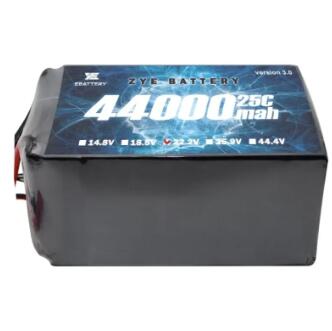Exploring the Technology and Considerations of Lipo Packs for Agricultural Drone Applications
2024-07-25
In the dynamic landscape of modern agriculture, the integration of technology such as agricultural drones has revolutionized farming practices, offering innovative solutions for crop management and yield optimization. Central to the operation of these drones are their power systems, with Lipo Packs (Lithium Polymer battery packs) playing a pivotal role in providing efficient and reliable energy storage. Let's delve deeper into the technology behind Lipo Packs and their specific considerations in the context of agricultural drone applications.
Technology Behind Lipo Packs:
Lipo Packs are advanced battery solutions characterized by their high energy density, lightweight construction, and ability to deliver consistent power output. These features make them well-suited for powering agricultural drones, where performance, efficiency, and reliability are paramount.
Key Features and Benefits:
1. High Energy Density: Lipo Packs offer a superior energy-to-weight ratio compared to traditional batteries, enabling drones to operate for extended durations on a single charge.
2. Lightweight Design: The lightweight nature of Lipo Packs reduces overall drone weight, enhancing flight efficiency, maneuverability, and payload capacity for sensors and equipment.
3. Fast Charging Capability: Lipo Packs support rapid charging, minimizing downtime between flights and maximizing operational efficiency in agricultural settings.
4. Temperature Stability: These battery packs exhibit good temperature performance, maintaining stable operation across a range of environmental conditions typically encountered in agricultural operations.
Applications in Agriculture:
- Field Mapping and Surveying: Drones powered by Lipo Packs facilitate aerial mapping and surveying of agricultural land, providing detailed data on soil composition, topography, and drainage patterns.
- Precision Spraying: Lipo Pack-powered drones enable precise application of fertilizers, pesticides, and herbicides, reducing chemical usage and optimizing crop health management.
- Crop Monitoring: Drones equipped with Lipo Packs monitor crop health, detect early signs of disease or stress, and assess vegetation indices, aiding in timely decision-making and interventions.
Considerations for Deployment:
- Battery Life and Management: Understanding the operational lifespan of Lipo Packs and implementing proper charging, storage, and maintenance practices are essential to prolong battery longevity and ensure consistent performance.
- Safety and Compliance: Adhering to safety protocols and regulatory requirements related to battery handling, drone operations, and aerial applications in agriculture is crucial for safe and compliant deployment.
Future Trends and Innovations:
Future advancements in Lipo Pack technology may focus on enhancing energy efficiency, extending operational range, integrating smart monitoring capabilities for battery health, and improving environmental sustainability in agricultural practices.
Conclusion
Lipo Packs represent a cornerstone technology in the advancement of agricultural drones, offering farmers and agronomists powerful tools for precision farming and sustainable crop management. By leveraging the lightweight design, high energy density, and reliable performance of Lipo Packs, agricultural stakeholders can harness drone technology to optimize productivity, minimize environmental impact, and achieve greater efficiency in crop production and management. As technology continues to evolve, Lipo Packs are poised to play a pivotal role in shaping the future of smart agriculture, driving innovation, and enhancing agricultural sustainability worldwide.



